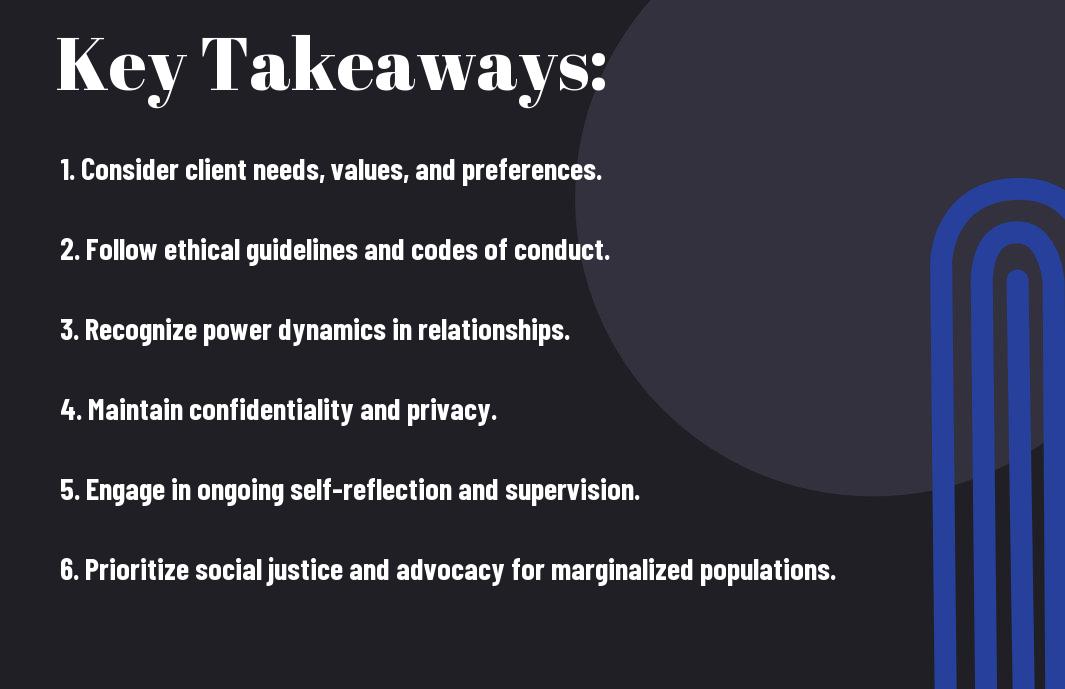Last Updated on August 18, 2024 by Muzammil Ijaz
Decision-Making in social work is a critical aspect of the profession, guiding practitioners in navigating complex ethical dilemmas. Ethical decision making is the process of evaluating and choosing among options in a manner consistent with professional ethical standards. It involves considering the most important principles of social work, such as client autonomy, confidentiality, and social justice, while assessing potential risks and benefits. Furthermore, ethical decision making in social work aims to prevent harm and promote the well-being of vulnerable populations through positive actions and interventions. Understanding the principles and processes involved in ethical decision making is imperative for social workers to uphold the ethical standards of the profession and ensure the best possible outcomes for their clients.
Key Takeaways:
- Ethical Standards: Social work ethical decision making involves adhering to the profession’s code of ethics which includes principles such as service, social justice, dignity and worth of the person, importance of human relationships, integrity, and competence.
- Conflict Resolution: Social workers often face ethical dilemmas that require careful consideration and reflection. They need to identify conflicts of interest, uphold client confidentiality, and make decisions that prioritize the well-being of clients and communities.
- Supervision and Consultation: Social workers should engage in supervision and consultation with colleagues and supervisors when facing complex ethical decisions. This process allows for feedback, guidance, and critical analysis to ensure that decisions are in line with ethical principles and professional standards.

Theoretical Frameworks for Ethical Decisions
Deontological Ethics in Social Work
There’s a fundamental principle in deontological ethics that emphasizes the importance of following moral rules and obligations. In the context of social work, adherence to ethical guidelines and professional codes of conduct is crucial. Social workers must make decisions based on their duty to do what is right, regardless of the consequences.
Consequentialist Approaches
Social work often involves complex situations where decisions can have a profound impact on individuals and communities. Consequentialist approaches, such as utilitarianism, focus on the outcomes of actions and aim to maximize the greatest good for the greatest number. This approach highlights the importance of considering the potential consequences of decisions in the ethical decision-making process.
The consideration of consequences in ethical decision making can sometimes lead to difficult choices. While the focus is on achieving positive outcomes, it is important for social workers to also assess the potential risks and unintended consequences of their actions. In striving to promote the well-being of clients and society, social workers must navigate the ethical complexities inherent in their work.
The Code of Ethics in Social Work
Once again, the Code of Ethics in social work stands as a cornerstone for ethical decision-making in the profession. Developed by the National Association of Social Workers (NASW), this code provides a set of guidelines and values that all social workers are expected to uphold in their practice.
Principles and Standards
For social workers, the Code of Ethics outlines core principles such as service, social justice, dignity and worth of the person, importance of human relationships, integrity, and competence. These principles guide social workers in their interactions with clients, colleagues, and the community, emphasizing the importance of ethical behavior in all aspects of their work.
Applying the Code to Real-World Scenarios
Code of Ethics in Social Work is not just a theoretical document but a practical tool for social workers facing ethical dilemmas in their practice. Social workers are encouraged to apply the code to real-world scenarios by critically analyzing the ethical issues at play, consulting with supervisors and colleagues, and making decisions that prioritize the well-being and rights of their clients.
Scenarios: When faced with conflicting loyalties between a client’s confidentiality and the safety of others, social workers must navigate this ethical dilemma carefully, weighing the potential risks and benefits of each course of action. Neglecting to follow the Code of Ethics can have severe consequences, including harm to clients, damage to professional reputation, and legal repercussions.
The Process of Making Ethical Decisions
All social workers are bound by a code of ethics that guides their practice and decision-making processes. Ethical decision-making is a crucial aspect of social work, as it ensures that professionals act in the best interests of their clients and uphold the values of the profession. According to Ethical Decision-Making of Social Welfare Workers in the…, ethical decision-making involves a systematic process that helps social workers navigate complex ethical dilemmas.
Identifying Ethical Dilemmas
The first step in the process of making ethical decisions is identifying the ethical dilemmas present in a given situation. These dilemmas arise when there are conflicting values, interests, or duties that make it challenging to determine the right course of action. Social workers must carefully examine the situation and consider the potential consequences of their actions on all parties involved.
Tools and Models for Decision Making
With the complexity of ethical dilemmas in social work, various tools and models have been developed to assist professionals in making well-informed decisions. These tools provide frameworks for analyzing ethical issues, weighing different courses of action, and considering the ethical principles that should guide decision-making. Social workers can utilize these tools to ensure that their decisions are thoughtful, ethical, and in line with professional standards.
Challenges in Ethical Decision Making
Personal Values vs. Professional Responsibilities
To navigate ethical decision making in social work, workers often face the challenge of balancing their personal values with their professional responsibilities. The subjective nature of values can sometimes conflict with the ethical obligations outlined by the profession, requiring social workers to critically reflect on their own beliefs and biases.
Cultural Sensitivity and Ethical Relativism
Making ethical decisions in social work also involves the consideration of cultural sensitivity and ethical relativism. This requires social workers to acknowledge and respect the diversity of values and norms that exist among clients, while still upholding universal ethical principles.
Professional boundaries can become blurred when navigating between respecting cultural practices and maintaining ethical standards. Social workers must find a balance that honors the beliefs of their clients without compromising the ethical code of conduct set forth by the profession.
Conclusion
Upon reflecting on what ethical decision-making in social work entails, it is clear that it is a complex process that involves balancing the needs and rights of clients with the ethical standards of the profession. Social workers must navigate difficult situations, considering the potential risks and benefits of different courses of action. It is crucial for social workers to be well-versed in ethical principles, guidelines, and codes of conduct to ensure that they uphold the values of social work practice. By making ethical decisions, social workers can promote the well-being and dignity of their clients while maintaining professional integrity and trustworthiness.
FAQ
A: Ethical decision making in social work refers to the process of making choices that are in line with professional standards and values. Social workers are bound by a code of ethics that guides their decision making to ensure that they are acting in the best interests of their clients and upholding the principles of justice, integrity, and respect.
A: Ethical decision making is crucial in social work because it helps to protect the well-being of clients and maintain the integrity of the profession. By following ethical guidelines, social workers can ensure that they are providing the best possible care and support to those in need, while also upholding the reputation of the field.
A: Some key principles of ethical decision making in social work include autonomy (respecting the rights and choices of clients), beneficence (doing good for clients), non-maleficence (avoiding harm to clients), and justice (ensuring fair and equal treatment for all). Social workers must also consider cultural competence, confidentiality, and boundaries in their ethical decision making processes.
Blogger By Passion, Programmer By Love And SEO Expert By Birth.This Quote Explain Me Perfectly. I did Bachelor’s in social work from the University of Sargodha
